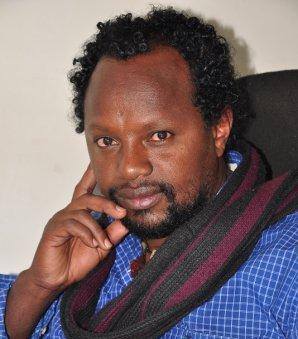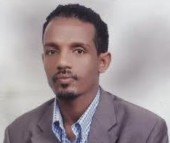Temesgen Desalegn: An Ethiopian Journalist’s Uniqueness and Ordeals
by Chalachew Tadesse / December 7, 2015 / No comments

Editor and journalist Temesgen Desalegn. Image via Facebook.
The case of imprisoned Ethiopian journalist Temesgen Desalegn deserves more international attention and further advocacy.
One Ethiopian journalist has not received enough attention since his imprisonment in October 2014. His name is Temesgen Desalegn, and he has been an unyielding, fierce critic of the Ethiopian authoritarian regime for many years. Presumably, he was overshadowed by the intensive world-wide international campaign to release the Zone 9 bloggers.

- This column’s topics will include literature, art, education, history, and political culture in Ethiopia, as well as society and politics in the Horn of Africa. Moreover, I will address the tribulations of journalists and the ill-fated constitutional right of freedom of expression under Ethiopia’s deceptive authoritarian regime. I will try to be the voice of the voiceless, be it persecuted journalists at home or exiled journalists abroad. These themes will make Ethiopia’s uniqueness and absurdities evident.

- Chalachew Tadesse is an Ethiopian journalist and columnist. He has previously worked as a full time journalist for The Reporter and The Sub-Saharan Informer English newspapers. He was also a columnist for the much-acclaimed Fact magazine, before the Ethiopian regime closed it in October 2014. A political science student by training, he works as a university lecturer and is known for his sociopolitical commentaries on the Ethiopian private press.
Despite having 35 pending court cases over his head, Temesgen tested the regime’s resolve by reappearing as editor or columnist in four consecutive publications: Feteh, Addis Times, Le’elina and finally Fact, where I wrote as a columnist. The saga between Temesgen and the government quickly turned into a cat-and-mouse game, as the government shut down each of the publications in turn between 2008 and 2014.
But even when his fourth publication Fact was shunned during the August 2014 near-total shutdown of the private press, Temesgen was unyielding. Instead, he continued to search for other avenues to publish his criticisms. As the saying goes, “When the going gets tough, the tough get going.” Alas, this time it wasn’t meant to be.
In October 2014, the government reinstated “defamation” and “inciting violence” charges against Temesgen. The charges dated from 2012 for which Temesgen was imprisoned briefly, before prosecution was abandoned. Finally, the court sentenced him to a three-year prison term. Since then, he has languished in the notorious Ziway prison (located in the hottest Great Rift Valley region), 165 kilometers outside the capital. That was how the infamous seven-year long war of attrition against the defiant journalist-cum-activist came to an end, at least for the time being.
Strangely, the reinstated charges relate to a Feteh newspaper front-page story concerning details of the illness of former authoritarian Prime Minister Meles Zenawi. In fact, the authorities confiscated the publication before circulation and, hence, the story never reached the public, although rumors about it had already spread widely. But, the story was perfectly correct, for Meles died of unexplained illness the following month. Unfortunately, Temesgen was never vindicated in the kangaroo court.
Ethiopia’s 2008 repressive media law allows the government to block distribution of publications, should the authorities believe the stories they report carry a “clear and present grave danger to national security.” Compared to the preceding press law, this clause was a step backward. At the time I wondered: “For God’s sake, how on earth does a story about a leader’s health condition have anything to do with national security?”
Forcing journalists into exile is the preferred option for the government. If the journalist refuses to do so, it is highly likely to be followed with trumped-up charges. In light of this, Temesgen stands out as a peculiar journalist. He would not even travel abroad, for fear of the risk that the authorities would use this as a pretense to fabricate allegations that he met and received instructions from some unknown “anti-Ethiopian foreign enemies.” By the way, these “enemies” always remain faceless and nameless to Ethiopians.
The regime knows well how much freedom of expression devastated Prime Minister Meles. At a G8 Food Security Symposium in Washington, DC in May 2012, Abebe Gelaw, a US-based Ethiopian journalist in exile, yelled at the flamboyant Meles (who was then seated next to US President Barrack Obama) while he was speaking about Ethiopia’s food self-sufficiency. Abebe exclaimed emphatically: “Meles is a dictator. We need freedom…freedom!” The devastated Meles, never used to public criticism, was never seen in public again in Ethiopia for he died due to unexplained health complications after two months. Meles’ final appearance abroad was at the G-20 in Mexico in June 2012.
I brought Abebe’s story here for one reason: In no uncertain terms, Temesgen was par excellence another Abebe inside Ethiopia in terms of his fierce critical writings. In fact, when I see Temesgen in retrospect, I would say he was largely a journalist-cum-activist. He pushed journalism to its extreme limits so much so that the line demarcating it from activism became blurred. But that is, I think, what we are inevitably bound to face in a repressive regime, and Temesgen is no exception.
Contrary to persistent rhetoric of food self-sufficiency, a severe famine has now befallen Ethiopia. More than eight million people are in need of emergency food aid. In what is quintessential of the regime’s behavior, the authorities have now imposed an internal administrative ban that restricts the movement of journalists to cover the famine. A regime that conducted a farcical election last May in which the ruling party won 100 percent “victory,” without press scrutiny, is again bent on hiding a looming starvation from the media. Yet the fact remains: Ethiopia is too large to seal it off from media scrutiny, local or foreign.
One more reason makes Temesgen unique: He is the first journalist in the country convicted for merely writing in the press. So far, the regime’s courts have convicted journalists for crimes of complicity with unknown “foreign enemies” or “terrorist organizations,” based on charges of attempts to “destabilize the constitutional order and the peace of the country.” This makes Temesgen’s conviction tantamount to a blanket conviction against the very spirit of freedom of expression and press as a whole. Defenders of human rights should never fail to take this serious danger to freedom of expression into account.
Simply for his writings, Temesgen now suffers from two concurrent ordeals. First, on numerous occasions the authorities denied him access to family and visitors without any explanation whatsoever. Worse, he has been suffering from chronic back pain, yet the authorities have rebuffed all requests to allow him get medical treatment. Credible sources, including the Voice of America Radio that airs programs specifically to Ethiopian audiences, claimed in October 2015 that Temesgen’s health had deteriorated and he had lost partial hearing.
In part, Temesgen’s article exposing the ill treatment of prisoners, which was slipped out of prison in February 2015 and published in several news websites, could be a reason for his ordeal. In Ethiopia, these ordeals are hardly surprising, however. The regime in general harbors irreverence to the constitution it claims to defend. Alas, it also harbors extreme vengeance against those who speak truth to power.
In actual fact, Temesgen has been forgotten under the shadow of the recently acquitted and released Zone-9 bloggers. Yet I must also point out that Zelalem, a member of the Zone 9 bloggers, was denied exit from the country one week ago while heading to Brussels to receive the 2015 Reporters without Borders Award given to the collective blogging group. In any case, Temesgen’s right of access to family, legal counsel, visitors, and medical treatment is long overdue. Ethiopia’s handling of imprisoned journalists and the press in general has gone beyond intolerable limits.
Now, instead of believing the Ethiopian prime minister’s recent remark that he is “open to criticism,” which is nothing more than the usual lip service, all defenders of freedom of expression should step up the pressure on the government to unconditionally release all imprisoned journalists languishing in notorious prison cells, including my former colleague, Temesgen Desalegn.




